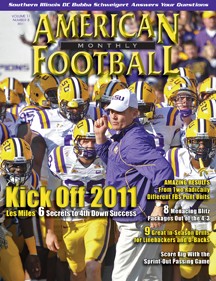Article CategoriesAFM Magazine
|
Rolling the Dice – Knowing the capabilities of your players is critical when evaluating the risk vs. the reward of going for it on fourth down.by: Larry Hartstein© More from this issue Les Miles is known as the Mad Hatter and the Riverboat Gambler. The perception is that, on any given fourth down, he will reach into his bag of tricks and attempt a high-risk play. But do those monikers really fit? Take 2010. LSU did lead the nation in fourth-down percentage, converting 11 of 12 times. But all but two SEC teams went for it on fourth down more often. Half the league attempted 19 or more fourth-down conversions. So it’s not as if Miles views every fourth down as a chance to pull out the stops. As he put it, “If you think about it, I’m not as wild as everybody likes to think. “I’m not necessarily a fourth-down guy,” Miles continued in an interview with AFM. “I don’t come into game plans with an eye on that down. That’s honestly a down when we plan to punt, kick a field goal, or have ....The full article can only be seen by subscribers.
|
|
|||||||
| HOME |
MAGAZINE |
SUBSCRIBE | ONLINE COLUMNISTS | COACHING VIDEOS |
Copyright 2026, AmericanFootballMonthly.com
All Rights Reserved





